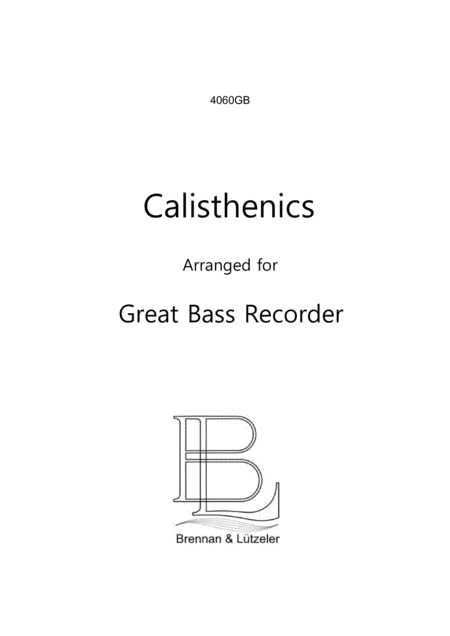Small Ensemble Baritone Recorder,Bassoon - Level 3 - Digital Download SKU: A0.842539 Composed by Various (Collection). Arranged by B. Brennan. Concert,Instructional,Romantic Period,Standards. Score and parts. 24 pages. Bl_music #5290017. Published by bl_music (A0.842539). Calisthenics for Great Bass Recorder 15 Solo-Etudes, Gallops, Polkas, Variations (notation: bass clef) 15 entertaining solo-etudes: Rondos, Polkas, Gallops, Variations….. all suitable for intermediate to advanced students as well as professionals; as exercises for the fingers, just for the fun of it or as (shorter) concert /contest pieces or encores. What are Calisthenics? You’ve all come across them in one form or another….mainly probably in caricatures of Victorian or Edwardian men in boldly striped sportswear lifting heavy weights or Victorian ladies elegantly waving their arms around(see photo) We found the idea of daily exercises in combination with utterly lovely tunes so intriguing that we decided to call our latest publication Calisthenics The music combines training of speed, thumb technique, interpretation. Short: another great fun and educational publication. The word calisthenics is derived from the Greek, kalos, beautiful; and sthenos, strength; the object of calisthenic exercises being to secure physical beauty by developing the limbs and muscles of the human frame, and making the joints flexible, thereby giving strength and power, and ensuring a graceful carriage, erect bearing, and freedom to the figure. In the words of the old Victorians: The highest refinement of that beauty is unattainable without splendour of activity and delicate strength. Exercise is now recognised to be as great a necessity in woman's education as in man's we are learning that many bodily defects and much of her weak health is attributable to the want of it; more especially in youth, when the frame is growing. Such exercises must, however, be carried out under a system; irregularly conducted, they do more harm than good. The constitution must be coaxed, not strained; the strength not unduly taxed, no over-fatigue ensuing; for exhaustion makes people look worn and old. The exertion must not be too violent, and the health and physical development of each pupil must be specially studied. Early morning or evening are the best times to select, but on no account immediately after a meal. The clothing should not be too warm, nor interfere in any way with the action of the limbs. A musical accompaniment will best preserve the necessary rhythm - the time, four or eight beats to a bar; failing this, the pupils should be taught to sing or count in concert, thereby keeping up their interest and zest. A castanet will, failing better means, help to mark the time with or without music. One of our aims is to revive these compositions and bring them to the attention of players and audiences.
